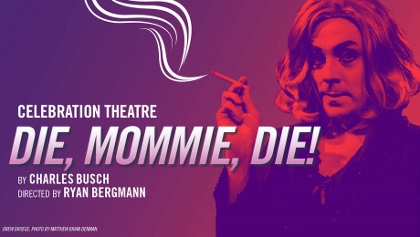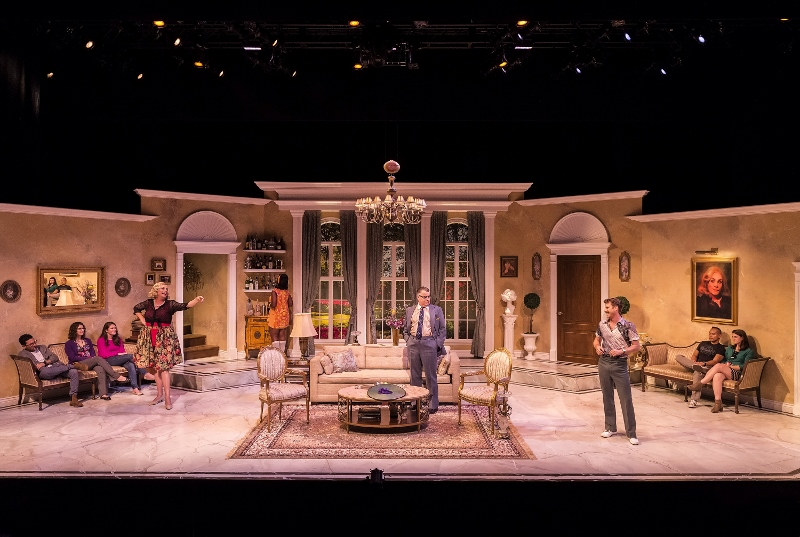“I’M NOT ALONE ANYMORE, I HAVE ME!”
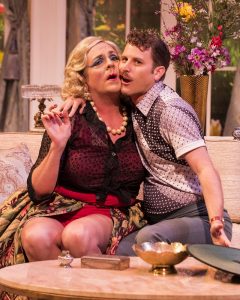 Charles Busch once said he thought of himself as the Loretta Young of drag, specializing in creatures of artifice, vanity, and soulful, often unrequited longing. Even as far back as playing the ingénue haunted by a terrible secret in Psycho Beach Party, you could see the leading lady to come. Busch has commanded the stage as the ageless monster of Vampire Lesbians of Sodom, the mysterious woman with shady origins in Shanghai Moon, and the icons of Red Scare on Sunset and The Lady in Question, among others. When the latter play premiered, no less than Frank Rich in the New York Times went straight to the
Charles Busch once said he thought of himself as the Loretta Young of drag, specializing in creatures of artifice, vanity, and soulful, often unrequited longing. Even as far back as playing the ingénue haunted by a terrible secret in Psycho Beach Party, you could see the leading lady to come. Busch has commanded the stage as the ageless monster of Vampire Lesbians of Sodom, the mysterious woman with shady origins in Shanghai Moon, and the icons of Red Scare on Sunset and The Lady in Question, among others. When the latter play premiered, no less than Frank Rich in the New York Times went straight to the  point, proclaiming what he considered to be in inarguable fact: “The lady in question is a star!”
point, proclaiming what he considered to be in inarguable fact: “The lady in question is a star!”
Yet, Charles Busch didn’t just embody these women, he created them. He is an accomplished playwright with an ear for over-the-top zingers of Hollywood melodramas, but also for quick, naughty, sometimes gleefully vulgar comedy. Beyond the camp and beyond the overwrought drama, his dialogue also reveals what I consider to be the true basis for his enduring success: Love.
Charles Busch loves these women with all his heart — not just the characters he has written, but their inspiration — the Hollywood legends who tore up the box office with the kind of gaudily emotional “women’s pictures” that are unimaginable now: the tearjerkers, love stories, and film noirs with stars like Davis, Crawford, Stanwyck, and later, Susan Hayward, Jane Wyman, and Lana Turner — all playing women motivated by desperate longing, do-or-die recklessness, and fiery passion. Wardrobe was usually everything. Publicity for Imitation of Life in 1959, for instance, trumpeted Lana Turner’s over-$1 million collection of jewelry and her lavish $78,000 Jean Louis wardrobe with 34 costume changes.
Die, Mommie, Die!, one of Busch’s biggest hits (also immortalized as a 2003 film) is something of a hybrid. The plot and tone borrow from the lush, late-‘50s melodramas of directors like Douglas Sirk, as well as ‘60s “psychological thrillers” starring leading ladies past their prime, a genre that became known as Hagsploitation. Angela Arden, a singer and actress who was a very big deal in the ‘40s and ’50s, is, by 1967, desperate for a comeback. She stalks her Beverly Hills mansion, restless, bored, and sexually voracious — terrified that the vocal problems that derailed her career will spoil her resurrection.
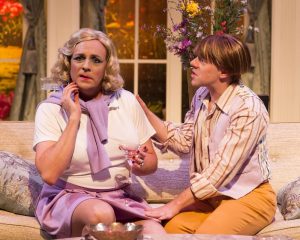 Angela’s husband Sol is a big Hollywood producer, daughter Edy has an unhealthy obsession for daddy, Angela’s maid Bootie is also in love with Sol, and Angela’s son Lance dresses up as his mother in between bipolar freak-outs. But Angela has planned a way out. She and her not-so-secret lover, the extraordinarily well-endowed Tony, are set to run away to New York, where a small townhouse in Greenwich Village and a comeback engagement at a nightclub in the Catskills await. She will finally be free and back on top.
Angela’s husband Sol is a big Hollywood producer, daughter Edy has an unhealthy obsession for daddy, Angela’s maid Bootie is also in love with Sol, and Angela’s son Lance dresses up as his mother in between bipolar freak-outs. But Angela has planned a way out. She and her not-so-secret lover, the extraordinarily well-endowed Tony, are set to run away to New York, where a small townhouse in Greenwich Village and a comeback engagement at a nightclub in the Catskills await. She will finally be free and back on top.
 Complications ensue. Can she overcome obstacles like murder, drug-induced hallucinations, a long-buried felony, incest, poison, threats from the mob, looming poverty, constipation and a twin-sister-twist straight out of not one, but two Bette Davis movies? Or will she give up her dreams by embracing a deeper truth? What do you think?
Complications ensue. Can she overcome obstacles like murder, drug-induced hallucinations, a long-buried felony, incest, poison, threats from the mob, looming poverty, constipation and a twin-sister-twist straight out of not one, but two Bette Davis movies? Or will she give up her dreams by embracing a deeper truth? What do you think?
The Celebration Theatre production — part of Center Theatre Group’s Block Party 2018 — stars Drew Droege as Angela. Droege first came to my attention in a series of hilarious, absurdist videos he began doing in 2010, where he created a sublime, alternate universe version of actress and fashion icon Chloë Sevigny. His approach to her is suffused with idiosyncratic language and pronunciation and what seems to me like a lot of affection. He celebrates Sevigny even as he parodies her eccentric public pronouncements. He loves her. And while Droege is very funny as Angela Arden, and always watchable, I miss the love.
This remounting, too, is often quite funny — and a psychedelic scene in the second act is well-staged by director Ryan Bergmann, who aims squarely for camp and hits the target. The audience is often in stitches. Yet the jokes and physical humor rarely rise above the slapdash fun of a weekend’s entertainment at Casita del Campo. The fourth wall is constantly broken — not the least of which because a few members of 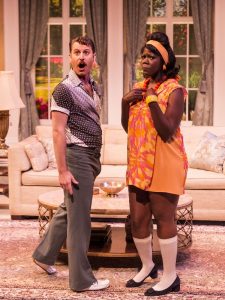 the audience sit on-stage. Using them as props for dick jokes and meta silliness works, but it spoils the emotional fantasy at the root of what makes Busch’s writing an enduring part of the American theatrical canon.
the audience sit on-stage. Using them as props for dick jokes and meta silliness works, but it spoils the emotional fantasy at the root of what makes Busch’s writing an enduring part of the American theatrical canon.
This revival at the Kirk Douglas Theatre in Culver City is nothing if not consistent though, and its single-vision emphasis on camp guides every choice. Even the opening filmed montage of Angela’s career setbacks and personal dramas is broad and crudely photoshopped as part of the joke, when a more expert approach might yield a result just as funny, but one that would also invite us into the illusion. That’s the thing: Illusion is hard work that requires meticulous attention to detail. Pete Hickok’s scenic design and Allison Dillard’s costumes skew toward sketch comedy, and Droege is rarely made to appear glamorous or beautiful, save for a second act gown of trailing chiffon and peak-a-boo lace that proves it can be done. In that dress Droege is a star — not of a drag club act, but of a full-blown stage fantasy.
Standouts in the rest of the cast include Andrew Carter as Tony, Gina Torrecilla as Bootise, and Tom DeTrinis as Lance. They bring a sense of rooted physicality and emotional logic to their characters’ whack-a-doodle actions. Carter preens and parades a giant (one assumes false) bulge in his crotch, lunging this way and that, practically hitting people in the face with it. Part of why it is so funny, is that Carter makes it seem like an organic part of the character’s gestalt. He is proud of himself. 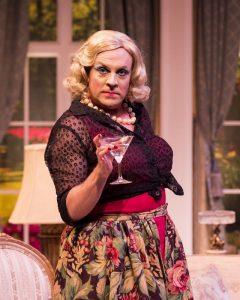 Torrecilla gives Bootsie’s obsessive love for Sol (and even for Dick Nixon) a genuine, unexpected sweetness, while DeTrinis, with his go-for-broke physicality and a mischievous twinkle in his eye, endows Lance with a warm, if very warped, humanity.
Torrecilla gives Bootsie’s obsessive love for Sol (and even for Dick Nixon) a genuine, unexpected sweetness, while DeTrinis, with his go-for-broke physicality and a mischievous twinkle in his eye, endows Lance with a warm, if very warped, humanity.
Strangely, this production of Die, Mommie, Die! has a running time of over two hours. The last production I saw in New York ran a peppy 90 minutes. I don’t know what accounts for the extra half hour here, but camp can become labored when allowed to go on too long, and I found my mind wandering during a long stretch of time without the leading lady. Then she returns, and the end builds toward her emotional breakthrough, a moment of ridiculously profound self-awareness. Angela willingly sacrifices her dreams, perhaps even her very life. By this point, most of the other characters have come to her side, pleading with her not to do it, that she cannot go on alone.
She turns with a beatific half smile. “I’m not alone anymore,” she says, head cocked to the side as if hearing a profundity from on high, “I have ME!” Then she bravely makes for the exit, into the waiting glare of off-stage paparazzi. Drew Droege nails the end. He rises to Angela’s big moment, digs deep beneath the character’s tinsel exterior, and finds the genuine tinsel inside.
photos by Craig Schwartz
Die, Mommie, Die!
Celebration Theatre
part of Block Party presented by Center Theatre Group
Kirk Douglas Theatre, 9820 Washington Blvd in Culver City
ends on May 20, 2018
for tickets, call 213.628.2772 or visit Celebration or CTG
